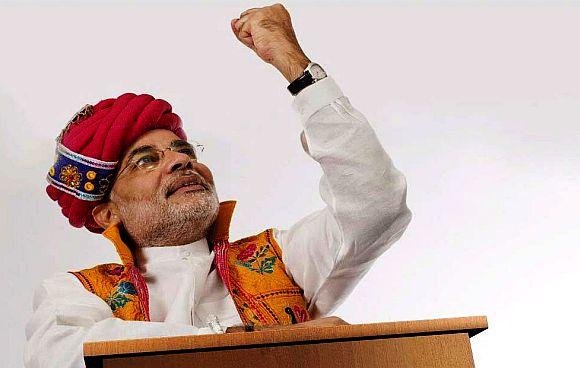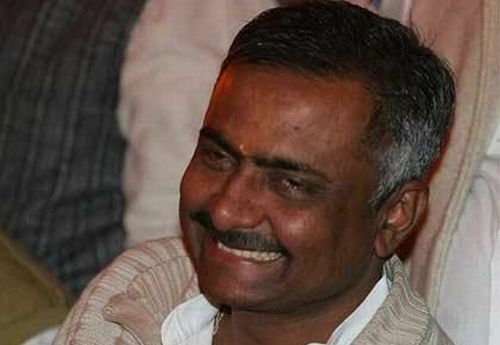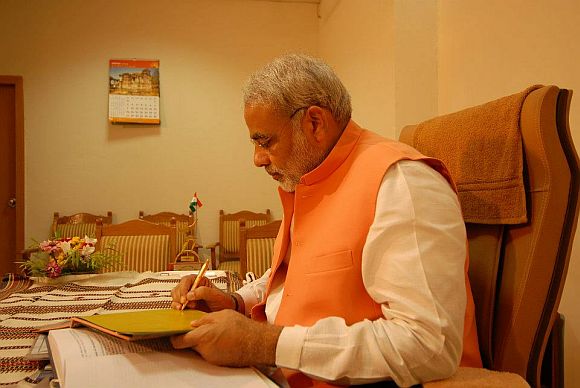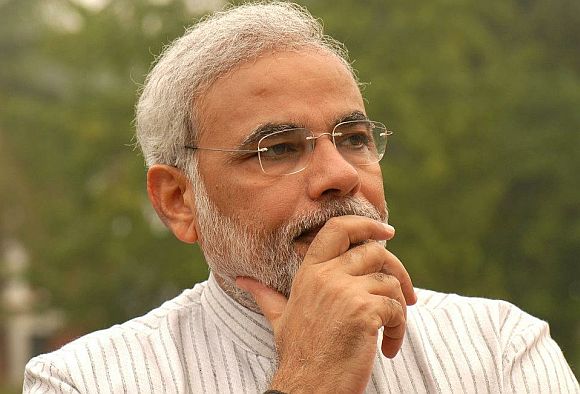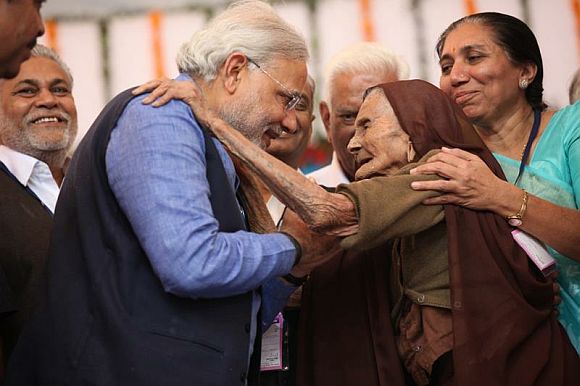 | « Back to article | Print this article |
Narendra Modi stands tall as Parivar bows before him
By successfully orchestrating the ouster of rival Sanjay Joshi from the Bharatiya Janata Party, Gujarat Chief Minister Narendra Modi has confirmed that the sangh parivar has fallen in line with his style of functioning and larger-than-the-organisation persona. Neerja Chowdhury reports
Just as big doors often swing on small hinges, the import of the Sanjay Joshi's resignation goes beyond the Bharatiya Janata Party.
Joshi's resignation from the primary membership of the BJP connotes the growing clout of Gujarat Chief Minister Narendra Modi in the party. And that has its own ramifications, for the BJP, for the sangh parivar, for BJP's ally Janata Dal-United and for the future of the Bihar government, for the ruling Congress and the Indian polity.
Sanjay Joshi's resignation is a sop to placate a Modi determined to have his way. But it could also be a message to all those who had raised a banner of revolt publicly in recent days against the Modi-Gadkari duo -- and this could include the LK Advani's blog, articles critical of Modi in BJP organ Kamal Sandesh and Rashtriya Swayamsevak Sangh mouthpiece Panchjanya and the rash of posters that were up in Delhi and Ahmedabad in praise of Sanjay Joshi.
This shows that the exit of Joshi, once the Sangh's blue eyed boy, had the blessings of the RSS's top leadership, though Modi's growing influence has divided not just the BJP right down the middle but also the sangh parivar.
Click on NEXT to read further...
Narendra Modi stands tall as Parivar bows before him
Modi was not satisfied just with Joshi's exit from the party's national executive. He had reportedly told some senior leaders when he was in Delhi last week that Nitin Gadkari had not stuck to his side of the bargain -- that he would ensure that Joshi quit the BJP.
Today, Modi had his way again. The Gujarat CM had also ensured that Joshi did not undertake the train journey from Mumbai to Delhi after the recent national executive meet, as he would have been feted by supporters at the railway stations en route in Gujarat. There too Modi's will prevailed.
Modi is worried not just about the damage potential of his sworn enemy, Sanjay Joshi, given his network of followers in Gujarat in the run up to the assembly elections in the state.
He also wants to send a signal that he is a tough -- and tall -- leader today, in the hope of swinging his state behind him again. For it is Gujarat -- and Modi will have to win the state again decisively to be able to play a larger role -- which will determine the course of Indian politics in 2013-14.
Click on NEXT to read further...
Narendra Modi stands tall as Parivar bows before him
As for the RSS leadership, it appears to have calculated that for all their disquiet about Modi's style of functioning and his larger-than-the-organisation persona, they have little option but to use him in order to win a larger support base.
It is possible that they may project him as the face of the party to campaign for the BJP next year, and leave the question of the prime minister open till the end, depending on how the situation pans out.
Many in the RSS brass feel that the primary task for the party is to strengthen the organisation and win supporters. The allies come later. If the BJP emerges as the single largest party with a respectable number in its kitty the allies will follow.
They do not tire of talking about how nobody, except Ram Vilas Paswan's Indian National Lok Dal, left the National Democratic Alliance even after the 2002 Gujarat violence.
As for the BJP's allies, the rise of Modi is going to pose a dilemma particularly for the JD-U, and for Nitish Kumar who has not hidden his political hostility towards the Gujarat CM. All India Anna Dravida Munnetra Kazhagam chief Jayalalithaa could look at BJP favourably for she enjoys a rapport with Modi.
Click on NEXT to read further...
Narendra Modi stands tall as Parivar bows before him
Bihar's Deputy Chief Minister Sushil Modi's censure of his Gujarat namesake -- saying that no one should be allowed to hijack the party or foist his will on it -- hours before Sanjay Joshi quit, may have been calculated to provide Nitish a fig leaf to hang together with the BJP in Bihar on the grounds that Sushil Modi is different from Modi.
But if Modi becomes the face of the party, would Nitish be compelled to look for other allies? Particularly those who can pull the upper caste votes to his side, as the BJP has done? Much will depend on how the Congress, otherwise in shambles in Bihar, uses the new opportunity that can come its way.
Modi's rise also has implications for the Congress, and its strategy for 2014. First, it will create serious questioning in the party on who should lead it with Modi on the other side.
The party, on the downslide for two years, could get a fill-up if Muslims start looking at it favourably. Whether or not Modi is officially designated as the BJP's prime ministerial candidate, he is using every available opportunity to send a signal to his supporters -- and opponents -- that he could be the man of the match in 2014.
Click on NEXT to read further...
Narendra Modi stands tall as Parivar bows before him
This will have its message for the Muslims, and could send them into the arms of the Congress in a national election.
If five out 10 Muslims vote in a normal election, it will be 9 out 10 Muslims voting if Modi is on the other side.
The emerging situation could also compel the Congress to review its stand on alliances, but this would mean bidding goodbye to the go-alone line of Rahul Gandhi.
Could it think of alliances with the secular, regional parties as it did in 2004, like the Samajwadi Party in Uttar Pradesh, and with Nitish Kumar or Lalu Prasad Yadav's Rashtriya Janata Dal in Bihar, to name only two?
Clearly, the mere possibility of Modi on the national horizon has the potential to polarise the country's politics in ways that could be unforeseen.
Click on NEXT to go further...
Top PHOTO features of the week
Click on MORE to see another set of PHOTO features...
